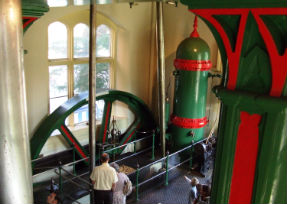What is the Flywheel?
A flywheel is defined by the sci-tech encyclopedia as a rotating mass used to maintain the speed of a machine between given limits while the machine receives or releases energy at a varying rate.
It is a device which has a high moment of inertia and stores rotational energy also known as kinetic energy. The flywheel stores energy on increase in its speed and releases energy on decrease in its speed by using a rotor and a generator. This process is also known as charging and discharging. During discharging, stored kinetic energy is transformed into electrical energy which is delivered constantly using a suitable control system. It thus acts as a storage device for energy.
Flywheel Energy Storage
The flywheel concept of energy storage has been utilized to create viable energy storage devices. Energy storage is a very important step when there is a need to use energy efficiently. Not all the energy generated during a mechanical operation is utilized and therefore the need to have storage devices which will store the energy that hasn’t been used.
The flywheel energy storage system works like a rechargeable battery but offer significant advantages over conventional chemical batteries.
Some of these advantages are listed below:
-
Longer operational life.
-
Insensitivity to temperature fluctuations.
-
Higher energy storage.
-
Higher output potential or discharge rate.
-
Less maintenance compared to chemical batteries.
-
Zero emissions.
Applications of Flywheel systems
Vehicles:
The flywheel energy storage system can be integrated into the internal combustion systems of vehicles. The advantage of using these systems is the lower dependence on fuel and lesser emissions. Most internal combustion engines run on fuel. When additional acceleration is required, engines consume more fuel to deliver additional performance. Flywheels can deliver the required energy and help in lowering fuel consumption. An example of such a system is the Kinetic Energy Recovery System that is used in motor sports particularly Formula One.
Uninterrupted Power Supply:
Flywheel systems can be used as additional power supply systems in hospitals and business data centers which require uninterrupted supply of power for their critical operations. They can be used along with the diesel fuel generators and conventional batteries currently being used for this purpose. The obvious benefit lies in lower dependence on fuel and lesser emissions. They also provide faster output rates as compared to chemical batteries but need less maintenance than batteries.
Ports:
The flywheel energy storage system can also be used to reduce dependence on diesel at ports. Cranes in ports use diesel to generate the energy needed to lift as well as lower containers from barges and cargo ships. The flywheel captures some of the energy generated during the lowering cycle which can then be utilized for the next lifting cycle. This helps in cutting down on the consumption of diesel and consequently cuts down on harmful emissions.
...Read more
Close










